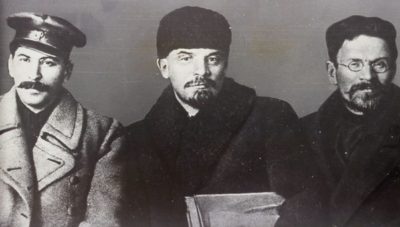As many readers are no doubt excited to learn, I continue making my way through the Russian Revolution unit in Mike Duncan’s podcast Revolutions. I’ve finally made it through his discussion of the Bolshevik victory in October 1917. Duncan lays out the main events in episodes 72-76.
But that’s not all he lays out in episodes 72-76. A number of leftists – usually sectarians, often ones very active on social media – look to the Bolsheviks as an example of a leftist success. Even some who don’t explicitly laud all their actions in those years still mine the writings of Lenin and/or Trotsky for good advice on strategy.
Let’s take a closer look.
The Example of the Bolsheviks
The Bolsheviks won in Russia in 1917. Or at least they had won by the end of the wars in the early 1920s. And they did so in part, especially in the early years, by shouting slogans more revolutionary than those of their rivals. Rivals like the Mensheviks, Socialist Revolutionaries, and so on. The Bolsheviks posed as the party of action. The other parties, they claimed, dithered in the face of hard choices.
So far, so good for the Very Online Leftists who look up to Lenin and Co.
Of course, shouting revolutionary slogans works only in certain situations. You know, like living in a country in the middle of a war crisis, during and after the fall of an authoritarian Czarist regime, and within an overall climate of political instability and change. Situations like the one in Russia in 1917, in other words.
Even given all that, the Bolsheviks barely won. As Duncan points out, they got lucky as much as they acted skillfully. Many rivals – from the Czar to to the Provisional Government of Kerensky to the less radical factions of the Mensheviks and SRs – blew many chances to defeat the Bolsheviks.
The Bolshevik “Plan”
Even after winning, Lenin and Trotsky struggled to hold socialist Russia together. Both knew the country was in rough shape. Both staked the long-term success of socialist Russia to a socialist revolution that would sweep across Europe and bail Russia out.
To put it mildly, that revolution never came. To put it more bluntly, there were never any good reasons to believe it would. At least not quickly enough to prevent Russia from falling into an authoritarian nightmare. Lenin and Trotsky invented readings of Marxism that told them it would happen. Many of them innovative and creative readings. But their predictions never made it beyond wishful thinking.
The Bolsheviks never built solid support among Russian peasants, who made up the vast majority of people in the (still mostly feudal) country. Lenin thought they could take a shortcut around this problem by taking power first and then winning over the peasants through expropriation and local control of land (policies the peasants strongly supported).
It even worked for a brief time. But the sorry state of the country doomed the follow through. And even had it gone well – which, of course, it didn’t – the Bolsheviks still had dubious prospects for success.
Why? Turns out it’s important to build a majority. And not just after seizing power, but before the revolution. Instead, the Bolsheviks tried to conjure up a majority without putting in the right organizing effort up front. And it showed. Boy did it show. These events produced mistrust, opposition, and ultimately Bolshevik atrocities against the very people it needed for a majority.
Lessons
Amazingly, lots of leftists still argue for this strategy! They think they can take power first and then win people over by appealing to their ‘interests.’ Yeah, that’s not how it works.
All this terminates, in the Duncan podcast, in episode 76: liberty or victory. Readers surely know which route the Bolsheviks chose. But to get into specifics, they rejected the results of the first election after the October Revolution. However, an entire series of errors led to the need to make this choice in the first place.
In short, there aren’t many positive lessons from the Bolshevik ‘success’ that apply to other times and places. Other than perhaps to strike while the iron is hot. But the failure of Lenin and Trotsky to do serious long-term planning temper even that lesson. Basing one’s politics and strategy on the Bolsheviks would be extremely foolish.
In short, the Bolsheviks are mostly a terrible example to follow. And not just due to the final outcomes. Their methods were also bad. We could defend many of Lenin’s choices and analyses in context. And some of them help us understand the world today. But there’s not much we can take from the Bolshevik state that would help us in the U.S. in 2023.
